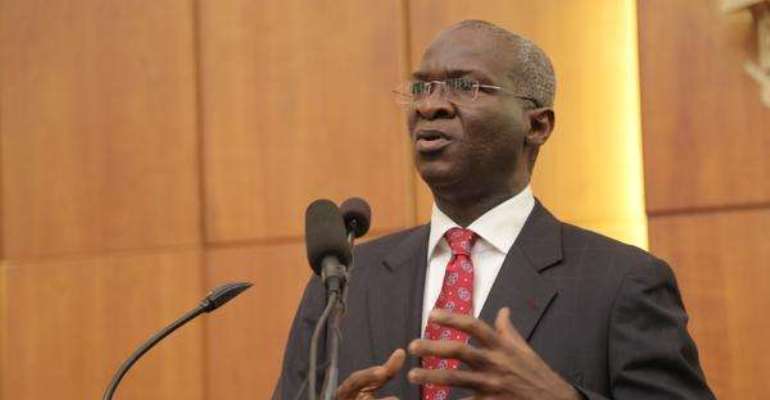Poor Electricity: FG Sacks Abubakar Atiku as NASS Summons Fashola

The leadership crisis rocking the Transmission Company of Nigeria (TCN) yesterday took a new dimension as Federal Government announced the ‘removal’ of its Managing Director/Chief Executive Officer, Dr. Abubakar Atiku.
Atiku, who was replaced with a chartered Accountant, Mr. Usman Gur Mohammed, was appointed CEO last year after the Canadian consulting company, Manitoba Hydro International, stopped running TCN late last year.
Following Atiku’s removal, the National Assembly Joint Committee on Power, yesterday summoned Minister of Power, Works and Housing, Mr. Babatunde Fashola, over the sudden change in the leadership of TCN and its attendant crisis. However, sources from the TCN headquarters in Abuja alleged that Atiku was relieved of his duties for ‘inefficiency’.
The Federal Capital Territory (FCT) chapter of the National Union of Electricity Employee (NUEE), had on Wednesday, protested the alleged plan by Fashola to remove Atiku. According to the union, Atiku was allegedly removed to pave way for a government appointee to manage the alleged $364 million World Bank loan.
Before his removal, Atiku had briefed the press, stating that the market operators owed Transition Company over N100 billion. However, a statement to justify Atiku’s removal was signed yesterday by the Permanent Secretary, Ministry of Power, Mr. Louis Edozie.
The statement read: “The Federal Government has approved the secondment of Usman Gur Mohammed from the African Development Bank (AfDB), as the interim Managing Director/ Chief Executive Officer of Transmission Company of Nigeria (TCN).” While justifying Mohammed’s appointment, Edozie said: “Nigeria’s power sector is in transition from a vertically integrated government owned statutory monopoly to an industry in which private and publicly owned companies interact through contracts under the regulation of the Nigerian Electricity Regulatory Commission (NERC).
“Since 2013, the generation companies who produce the electricity we all consume and the distribution companies who deliver it to our homes, industries and businesses, are now being mainly privatelyowned companies.
“TCN, which transmits the electricity from the generation companies to the distribution companies for onward delivery and sale to customers, is currently owned by Federal Government of Nigeria FGN). In this role TCN operates two important licenses issued by NERC.
“As the Transmission Services Provider (TSP), TCN owns and operates the 132KV and 330KV high tension transmission lines and the 330/132/33KV substations that make up Nigeria’s national grid.
“As the Independent Systems Operator (ISO), TCN monitors and controls the national grid and when and how the power stations, which are owned by different companies, can supply electricity for delivery to distribution companies in a safe and orderly way.
TCN charges the distribution companies for these services.From 2012 to 2016 Manitoba Hydro International of Canada ran TCN as a management contractor.
With the exit of Manitoba, Mohammed comes with a clear mandate to review, validate and implement the best management structure, strategy, business plan and processes to take TCN, both TSP and ISO, to the next level of operational effectiveness.
“Mohammed has resumed duty with a 12 month non-extendable deadline to complete his transformational mandate and set TSP and ISO on a path of greater operational efficiency and effectiveness, and enhanced responsiveness to the needs of the generation companies and distribution companies, who are TCN’s customers.”
Meanwhile, the National Assembly Joint Committee on Power noted that the minister and other relevant officials were required to appear before the committee on February 6 at the National Assembly complex, Abuja.
The Joint Committee had earlier invited the minister to appear before it yesterday but he failed to honour the invitation. In a letter obtained by our correspondent in Abuja, the Joint Committee directed that the status quo ante in respect of the management of the TCN be maintained pending the outcome of the meeting of the minister with the committee. The committee also urged all staff of TCN and relevant stakeholders to maintain the peace in the overall interest of the country.
The letter, which was entitled, “The TCN leadership crisis and its effects on the power sector, was jointly signed by the Chairman, Senate Committee on Power, Steel Development and Metallurgy, Senator Enyinnaya Abaribe, and his counterpart in the House of Representatives, Daniel Asuquo.
Part of the letter reads:“The Joint Committee on Power of the National Assembly, acting on its powers of oversight, received disturbing correspondences and information regarding the sudden change in the leadership of TCN, and its attendant crisis.”
Source: Punch
